- Home
- Shannon Hale
Palace of Stone Page 16
Palace of Stone Read online
Page 16
No! The floor stones split as if the word were a mallet. The room quaked.
The bearded man’s hand tightened on the pistol, and Miri knew just before it happened that he would pull the trigger. No! came her quarry-shout, and as the pistol fired, the stone beneath the man’s feet cracked so violently he fell one way and Britta the other, the bullet striking the wall above her head.
No! The room gave one more shake. The rebels turned about, gripping their muskets, but there was no attacker to fire upon.
Britta curled up on the ground, her arms over her face just a heap of ragged, dirtied lace. The bearded man unsteadily recovered his feet. He turned to Miri, a second gun from his belt aimed at her.
“What are you doing?” he asked.
Miri turned up her empty hands. She hoped he did not notice how hard they shook. “Only talking. Just words.”
“You made the room quake,” he said.
“You give me too much credit. I’m telling you, this room was cut out of Mount Eskel. I’ve seen entire mountainsides tumble down. If you hurt one of Mount Eskel, this room will tear apart and bury you in it. You should leave.”
The rebels looked at each other.
“She said you should leave!” Frid shouted.
The bearded man took a step back, and the broken floor stones beneath him shifted. He gasped and ran for the door.
The royal party moved away as the rebels threw aside the bars, seized the door, and fled into the corridor.
Steffan was the first to Britta. He crouched beside her, putting his arms around her shoulders.
“Are you hurt?” he asked.
Britta shook her head but touched the red mark on Steffan’s neck where a musket had pressed him down.
“Shut the door,” Miri said.
Liana ran out just before the king helped Peder close the massive door and lower the bars back in place.
There were some light laughs, the others in the mood to celebrate. Miri peered into the closet to make certain no one else lingered. Her neck muscles felt as fraught as her stomach. Someone had orchestrated all of it—calling the royal guard away, leaving the palace unguarded, leading the attackers to the very chamber where the king would await rescue.
The assassin. He was out there somewhere. Perhaps in the palace. The day was not yet over, and Britta was still alive.
Chapter Nineteen
She’s as fetching as brown hair done up with ribbons blue
The mountain, my lady
She’s as sweet as pink flowers made bright with morning dew
Mount Eskel, my lady
Miri felt tense as an icicle, easy to shatter. She paced till she found herself standing beside Peder. He put his arm around her, and she forced herself to relax against him. His nearness eased her some, warmed the ice of her core. She had a sudden desire to rub her head against his neck, like an affectionate nanny goat. Miri snorted a laugh. Peder raised his eyebrows, a question.
“Goat humor,” she whispered back.
He shook his head. “Rocks tearing apart around you, and you’re thinking up nanny jokes.”
A fissure ran through the floor stones from the point where she and the other Eskelites had stood all the way to the closet. The walls and ceiling were intact, but the floor cracks were impressive.
“The guard will rally,” the king was saying. “My supporters will come forward.”
“What just occurred in here?” asked the queen.
“Mount Eskel got really mad,” said Frid, and the girls laughed.
“Did you know that would happen?” Peder asked.
“Not exactly,” said Miri. “But I had a … a feeling.”
Esa nodded in agreement. Miri met her eyes and wondered if Esa too had felt a flicker of invitation, a whisper of strength. The rock was not living—it had no mind, no thought. But it had responded to their quarry-speech like a goat to the call of its herder. She imagined that the power of generations of quarry-worker blows had lain dormant inside the rock and had moved at the sound of their quarry-shouts. The linder was a kind of history, Miri realized. Memories soaked up in the stone, ready to erupt.
The king kicked at a loose shard and shook his head. “Perhaps you could refrain from encouraging the rocks to split in the future? Linder is expensive to replace.”
Peder mumbled under his breath, “If you think it’s hard to replace a few floor stones, you should try cutting them out of a mountain.”
Steffan was bruised but not seriously hurt. Britta sat beside him, and they talked quietly, their foreheads pressed together. The other academy girls and servants took to the sofas and floor. Miri could only pace.
Peder was pacing his own path alongside the fissure.
“You think the assassin is still out there?” Miri whispered to Peder.
He glanced at the door and nodded.
Miri shivered. Waiting was a bitter game. She needed something to do. The king and queen sat on chairs, as rigid as ship masts. Miri crouched beside them.
“Your Majesty,” she said to the queen, “you knew how the rebels were feeling. Your advice helped me know what to say.”
The queen shook her head. “I was just guessing.”
“It may have seemed so,” said Miri, “but I think it was more than a guess.”
“Impertinence,” said Gummonth. “Stand back, girl.”
“Please, Your Highness, just talk with me a moment. I have reason to believe that the royal family is capable of sensing more than others can.”
Steffan and Britta had come closer.
“Like quarry-speech?” Britta asked.
“Sort of. Quarry-speech runs through linder. I think that only those exposed to raw linder over time can do it.”
“What are you talking about, quarry-speech?” said the king.
“It’s just … just something Eskelites can do, something the linder makes possible,” said Miri. “But I think what you can do is a little different. Have you read your father’s diary in the library? He referred to a secret—he called it ‘linder wisdom.’ I believe it’s the root of the tradition that only the royal family may live in the king’s wing, the only building in the world built entirely from linder. Over the years, being so surrounded by linder changes you somehow. And the kings of the past must have wanted to keep that advantage to their own families. Does any of this sound familiar?”
“Your Highness—” Gummonth began.
The king held up a hand to silence him and looked at Miri, an invitation to continue.
“I’m going to quarry-speak now,” Miri said, and she silently sang of the time the academy girls stood up to their strict tutor and fled the academy.
On hearing her quarry-speech, many of the Eskelites stood up.
“What is it, Miri?” Esa asked from across the room.
“Nothing, just ignore me, sorry,” said Miri. She turned back to the king. “If you had quarry-speaking ability, what I just said would have nudged a similar memory in you, perhaps inspiring you to stand up. But you can’t quarry-speak. On the mountain we’re inhaling linder dust and drinking from a stream white with it. Linder flows in our blood and coats our bones, while you’re encircled by it.”
The linder was outside for the royals, not inside. It must simply amplify the thoughts of those around them …. No, not thoughts exactly. Miri realized their linder wisdom would be less complicated than communicating in memories—less thought, more emotion.
Instead she tried to feel something the king might understand. She chose the time the princess academy tutor had punished Miri’s insubordination by locking her in a dark closet—the agony of being trapped, her terror of the rat in the dark, the fear and uncertainty. She quarry-spoke it to help herself experience the event all over again, making her emotions as loud inside her as a musket shot.
“How do you feel?” Miri asked, shivering at the memory. “Could you sense how I was feeling?”
“No …,” said the king.
His hesitation made her wonder.
He too had spent time in a dark closet, locked in alone, afraid.
“I was recalling a time I was abandoned in a closet,” she said. “I wondered if … if the way I felt reminded you of your own experience. With your brother.”
The king’s chin trembled under his beard. “Just because we are trapped in this room does not mean you may speak this way to your sovereign.”
“But I may never get another chance. Sire, you understand the rebels better than they could know—and not only because of your linder wisdom. Was it fair that just because he was born first, your brother could do whatever he liked? That because of his selfishness and cruelty, you and your mother were sent away?”
The king’s face reddened.
“I don’t understand what is happening,” said the queen.
“Some of your ancestors wrote of sensing what others felt,” said Miri. “Linder amplifies thought … and emotion too, I think. Because of the years you spend surrounded by linder, you three absorb that. Past kings were taught by their parents about this ability and how to use it. I believe King Bjorn’s parents and brother died before they could teach him of it.”
Gummonth made a sound of exasperation in his throat. “This is ridiculous—”
“Just a moment, Gummonth,” Steffan interrupted. “What Miri suggests … It’s true that when I’m home in this palace, I feel cramped by all the people ….”
“And their emotions?” said Miri.
“Perhaps that’s it. Whenever I’m here, I must …” He frowned.
“You close off,” said Britta. “You become a stone column.”
“So I don’t have to feel so much.” Steffan put a hand on Britta’s shoulder, and his expression seemed a kind of apology.
“Those ridiculous plays!” The king slammed his fist on a table. “That’s why I can’t stand them. I’m constantly flabbergasted by how some can watch and sigh and cry as if they almost believed it real, while I feel nauseated by the obvious disparity between the actor and the false emotions he expresses. Turn the theater into storage for all I care.”
“But the plays are so beautiful!” said Miri.
“Don’t you feel the same way, Miri?” asked Steffan.
“No. Quarry-speech is different. We can speak—or more like sing or think—memories through the linder to others. You are simply bombarded by the feelings of those around you. But maybe … if you know what linder does to you, you could pay more attention to it and hone your ability to listen. Or even block it. I imagine such a skill was helpful to past kings when weeding out liars and traitors.”
The king’s eyebrows raised.
“You could try right now,” said Miri. “What do you feel from the people in this room?”
The queen rubbed her arms. “I don’t know, but I do not like this room. It’s not safe.”
“I don’t think the stones will break—” Miri started.
The queen shook her head. “It’s as if … someone feels too much like that man who held a pistol to Britta’s head. It hurts my stomach.”
Steffan straightened and looked around.
“Who?” asked Miri.
“Over there.” The queen gestured vaguely.
Miri was surprised—and just a little disappointed—that she had not indicated Gummonth. The only other people in the room were the royal family, a few servants, Britta, Peder, and the academy girls—except Liana, who, strangely, had fled the safety of the room.
Miri leaned in closer to the queen and king. “Would any of these servants here have known you would come to this room when threatened?”
“Certainly,” said the queen.
“These are our personal servants, Miri,” said Steffan. “They wouldn’t betray us.”
Miri recalled reading in the history books that the royal family had a knack for selecting the most trustworthy servants and guards. Perhaps that had to do with the linder wisdom. She glanced at Gummonth, whose lips were stuck in a permanent snarl. If the king trusted him, he must be loyal, but that did not make him any more pleasant.
“Someone riled up that mob at the gate to keep you in the palace,” said Miri. “Someone told those rebels to hide in this room. And now that they’re gone, someone is still wishing you dead. Who?”
The royal family fell silent, as if straining for a sound just beyond hearing.
The queen stood, looking toward a cluttered corner full of barrels and crates. After a moment, the king’s eyes rested there as well. Steffan leaned forward.
“Is … is someone over there?” he asked.
Miri found herself squinting at the corner, as though narrowing her eyes would allow her to see through wood. It was too late by the time she realized that if the assassin was hidden there, he might be able to see them. He would know he was discovered. And he would act before being taken by surprise.
“Wait—” Miri started to whisper. Wait, don’t look, pretend you don’t know—
She was too slow. A lid was flung off a tall crate. A man rose up. He was dark haired with a stiff, pointy beard, and wore a long coat. As he stepped out of the crate, his coat swept back, and Miri could see he had at least a dozen pistols strapped to his chest and stuck in his belt.
Even as he climbed from the barrel, he lifted one pistol and aimed.
Britta.
Action without thought gave Miri speed, and she flung herself toward Britta, her arms out to push her away. But Peder was fast as well.
“Miri!” he said.
The crack of gunfire shattered the moment. Miri pushed Britta, and they slammed into the wall.
Peder was still standing. His expression showed utter shock. His hand was pressed to his middle, and through his fingers blood trickled. He sat down hard on the floor.
“Peder!”
On her first day in Asland, Miri had seen the king’s guards throw themselves in the path of danger, one taking a lead ball for his sovereign. Miri had marveled. What did they feel for the king that they would die for him?
Peder had put himself between Miri and the bullet.
A loud clatter tore her attention away. The assassin had tossed the spent pistol onto the stone floor. But he had plenty of others. He raised a second, aiming again at Britta.
Steffan was on his feet, running at the assassin. So was Frid, and perhaps others too. But no one was faster than a pistol ball. They would not stop him before he pulled the trigger. Nothing would stop him. He would shoot them all—Steffan, Frid, Esa, and Miri too, just as he had shot Peder. He would kill as many as he needed till he got to Britta.
Miri screamed. “No!”
Even as she screamed with her real voice, she screamed in quarry-speech. No! She did not quarry-speak a single memory but a lifetime of them, and not just her own. She filled that word with every story she’d heard of her father, of her grandparents, stories from Peder’s ma, Doter, and especially stories of her ma—the week she held baby Miri in her arms, the hazy memories Marda still kept, anecdotes the villagers told her alongside details Miri had just imagined. Stories true and made-up, songs and wishes and everything she knew of her family and Mount Eskel, the history of her home that no one had yet written down—all of it went into that one word.
At the same time, Miri became aware of the entire palace, as if it were her own body. She felt the weight of its stone, history running through the pink veins and silver, the green and the blue, the white stone embracing it all. The stone vibrated with her memories, her song, her scream. Her palace, her mountain, her body. She lifted her hands.
Her quarry-speech moved through the rock, and where it went, rock tore apart. A second fissure erupted from where she stood, traveling with the speed of one spoken word across the room, up the wall, tearing through the ceiling.
The assassin looked up.
The ceiling fell.
A puff of dust and debris filled the room. Miri rushed through it to Peder, placing her hand on his, getting wet with blood. His breathing was labored, his eyes wide open.
When
she glanced back where the assassin had stood, all she saw was a pile of broken linder. A lifetime near a quarry made her certain that no one could survive the weight of that much stone.
Katar and Frid flung aside the door’s bars and fled the room, quarry-speaking as they ran that they would get help. The king locked the door behind them. Miri thought it wise. As much as she wanted to get Peder out of that room, there could be other rebels in the palace, others with muskets, waiting their turn. Though if someone wanted to get in, Miri thought, they could simply go upstairs and lower themselves through the carriagesize gap in the ceiling.
I made that, Miri thought vaguely. But that massive hole felt a million times less important than the tiny one in Peder’s middle.
Esa went to her brother, gently pushing Miri aside. Miri sat on the floor. Her defiance was spent, her body tired of fighting, and she cried. But Esa was calm as she inspected Peder.
“The ball went clean through,” Esa said. “That’s good, Peder.”
“Ow! It doesn’t feel good,” he said.
Esa pressed a cloth to his wound, instructing others to wrap him and keep him warm.
“Don’t everybody fuss,” he whispered. “I’m all right.”
“You will be,” said Esa.
“It doesn’t even hurt that much.” He tried to sit up.
“Stop showing off for Miri,” said his sister. “You will let us take care of you, Peder Doterson, or I’ll tell Ma all about it, so lie still.”
He lay still.
They waited in the ruins of the room for the royal guard to rescue them. Everyone gathered in a circle around Peder, away from the fissures and the hole where white dust shifted like snowflakes. They sat on the smooth places between the cracked and jutting stone. They whispered questions that no one answered.
“Are we safe yet?”
“Is Peder all right?”
“What just happened?”
Miri was silent. She held Peder’s hand.

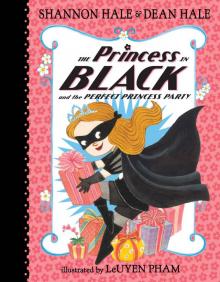 The Princess in Black and the Perfect Princess Party
The Princess in Black and the Perfect Princess Party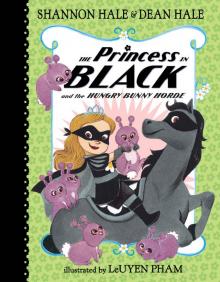 The Princess in Black and the Hungry Bunny Horde
The Princess in Black and the Hungry Bunny Horde The Unfairest of Them All
The Unfairest of Them All Forest Born
Forest Born 2 Fuzzy, 2 Furious
2 Fuzzy, 2 Furious The Actor and the Housewife
The Actor and the Housewife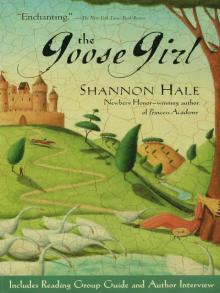 The Goose Girl
The Goose Girl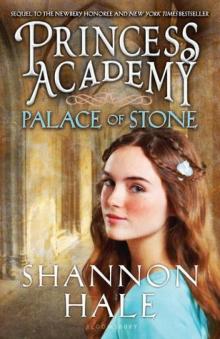 Palace of Stone
Palace of Stone Midnight in Austenland
Midnight in Austenland Enna Burning
Enna Burning Dangerous
Dangerous The Storybook of Legends
The Storybook of Legends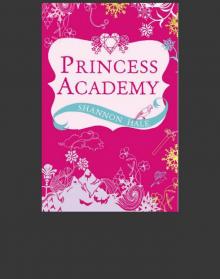 Princess Academy
Princess Academy Austenland
Austenland The Forgotten Sisters
The Forgotten Sisters The Unbeatable Squirrel Girl: Squirrel Meets World
The Unbeatable Squirrel Girl: Squirrel Meets World Book of a Thousand Days
Book of a Thousand Days Fire and Ice
Fire and Ice The Princess in Black Takes a Vacation
The Princess in Black Takes a Vacation River Secrets
River Secrets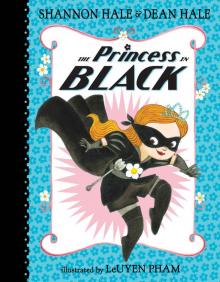 The Princess in Black
The Princess in Black Books of Bayern Series Bundle
Books of Bayern Series Bundle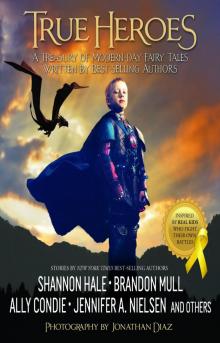 True Heroes
True Heroes Austenland: A Novel
Austenland: A Novel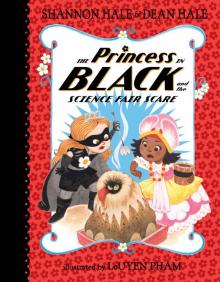 The Princess in Black and the Science Fair Scare
The Princess in Black and the Science Fair Scare![[Bayern 02] - Enna Burning Read online](http://i1.bookreadfree.com/i1/04/02/bayern_02_-_enna_burning_preview.jpg) [Bayern 02] - Enna Burning
[Bayern 02] - Enna Burning Ever After High
Ever After High Monster High/Ever After High--The Legend of Shadow High
Monster High/Ever After High--The Legend of Shadow High